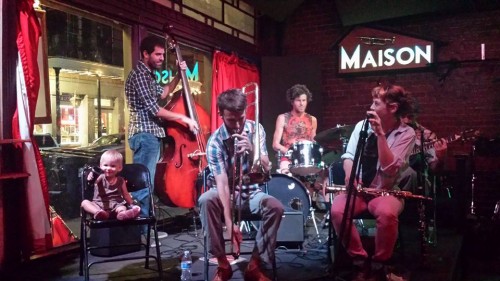In agriculture, monoculture is the practice of relying extensively on one crop with little biodiversity. In the 1840s, a famine in Ireland was caused by a disease that hit potatoes, the crop on which Irish people largely relied. At Understanding Evolution, an article reads:
The Irish potato clones were certainly low on genetic variation, so when the environment changed and a potato disease swept through the country in the 1840s, the potatoes (and the people who depended upon them) were devastated.
The article includes this illustration of how monocultures are vulnerable:
The Irish potato famine reveals how choices about how to feed populations, combined with biological realities, can have dramatic impacts on the world. In the three years that the famine lasted, one out of every eight Irish people died of starvation. Nearly a million emigrated to the United States, only to face poverty and discrimination, in part because of their large numbers.
The article continues:
Despite the warnings of evolution and history, much agriculture continues to depend on genetically uniform crops. The widespread planting of a single corn variety contributed to the loss of over a billion dollars worth of corn in 1970, when the U.S. crop was overwhelmed by a fungus. And in the 1980s, dependence upon a single type of grapevine root forced California grape growers to replant approximately two million acres of vines when a new race of the pest insect, grape phylloxera (Daktulosphaira vitifoliae, shown at right) attacked in the 1980s.
Gwen adds: The Irish potato famine is also an example of a reality about famines that we rarely discuss. In most famines there is food available in the country, but the government or local elites do not believe that those who are starving have any claim to that food. In the years of the Irish potato famine, British landowners continued to export wheat out of Ireland. The wheat crop wasn’t affected by the potato blight. But wheat was a commercial crop the British grew for profit. Potatoes were for Irish peasants to eat. We might think it would be obvious that when people are starving you’d make other food sources available to them, but that’s not what happened. In the social hierarchy of the time, many British elites didn’t believe that starving Irish people had a claim to their cash crop, and so they continued to ship wheat out of the country to other nations even while millions were dying or emigrating. Similarly, in the Ethiopian famines of the 1980s, the country wasn’t devoid of food; it’s just that poor rural people weren’t seen as having a right to food, and so available food was not redistributed to them. Many people in the country ate just fine while their fellow citizens starved.
So famine is often as much about politics and social hierarchies as it is about biology.













